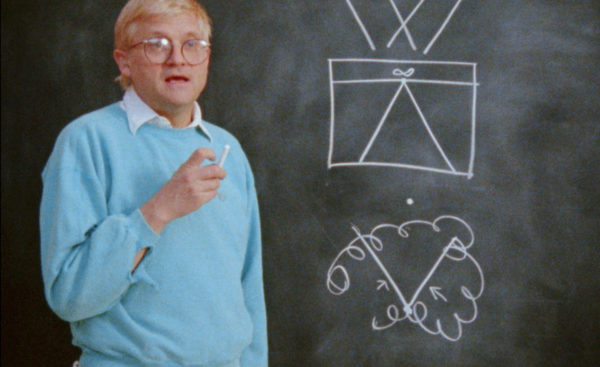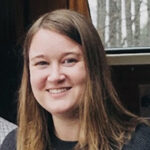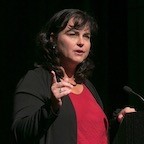

The Elections Committee submits this final slate of Candidates for the 2023 Board Election for the consideration of AMIA Members. All candidates are running for two-year terms.
Your ballot will include voting for three Board members and a President of the Board.
The 2023 AMIA Board and Officers Election closes on October 1, 2023 at 5:00pm (Pacific). Ballot information, including log in and password information, was emailed to all eligible members. If you wish to request a paper ballot, please contact the AMIA Office and one will be sent. Paper ballots must be received no later than October 1, 2023 at 5:00pm (Pacific).
All votes are anonymous and only the final election results are tallied. The ballot will require a 25% quorum to be valid, or 203 of 810 eligible votes.
The Ballot will close October 1, 2023 at 5:00pm (Pacific).
 Mackenzie Roberts Beasley
Mackenzie Roberts BeasleyGoals as a member of the AMIA Board. As a first-time board member, I would strive to better understand how AMIA works on the board level and if elected, use my place on the board to communicate what AMIA does more broadly. I want to help clarify to newer members of AMIA and new students how to utilize AMIA as a resource in their career. I would also want to continue fostering the positive developments of diversity inside AMIA and within the mentorship program. Voices from other communities are vital to the growth and strength of this field. According to participant’s feedback, the mentorship pilot project was very successful; I hope to support a permanent mentorship program for more students beyond the Pathways Fellowship.
One criticism I have heard is that AMIA is very American centric, and I would like to explore the possibility of having the conference be held outside of the US. At the very least, I would like to bring in more members of the global community to learn about their experiences and to provide more resources to colleagues with a lack of funding or experience. Time is of the essence to all AV materials, especially magnetic materials, and I think the only way we will preserve every community’s history is as a team.
Lastly, it would be an honor to be more involved with an organization that I have admired for years. When I attend AMIA, it gives me hope that if we work together, we can preserve the world’s audiovisual shared history.
Relevant Experience. I’ve been an AMIA member since my graduate degree and have served AMIA as a project task force member for the Mentorship Pilot project as well as a mentorship advisor in 2022. In my position as an Audiovisual Archivist at the Smithsonian Archives of American Art, I digitize and conserve various AV formats, collaborate with vendors, process audiovisual collections, host interns, and serve as a taskforce member on the pan-institutional Audiovisual Media Preservation Initiative. I also teach the Preservation and Digitization of Audiovisual Materials at the LSU’s School of Library and Information Science. My five seconds of fame came when I helped access the oldest footage of Mardi Gras; the film was inducted into the National Film Registry in 2022. Previously I have worked at the NARA Nixon Presidential Library, Smithsonian Channel, Smithsonian Folklife Center, NPR, NYPL Performing Arts Center, MOMI and Library of Congress.
 Daniela Currò
Daniela CurròGoals as a member of the AMIA Board. As a current Board member, should I be elected for a second term, I will continue pursuing the goals that brought me to the AMIA Board in 2021. I will continue working to support and develop our membership: education and professional development are fundamental goals of the association and themes particular dear to me. I will continue supporting AMIA’s trailblazing fellowship and mentorship programs and I will work with the AMIA office and other Board members to expand the online offer of recordings, live webinars, and symposia, an example being the very recent AMIA copyright symposium, but also to strengthen the AMIA annual conference, which remains the most important event for the whole membership. I will seek to expand AMIA’s outreach and advocacy, for instance by focusing on themes of environmental sustainability, and continue on the path to increase accessibility and inclusiveness for everyone, independently from background, financial means, or geographical location. I will keep supporting our community, which is a community of volunteers, working as a liaison between the Board and the AMIA committees. I will keep pursuing transparency and approachability for the Board and representation for the membership, so that everyone can feel they can participate in the life of the association, even if they just joined and they do not know anyone yet, that their voice is listened to, and their concerns and requests are embraced and addressed.
Relevant experience. I have been working in moving image archiving, preservation, and presentation for over 20 years. A graduate of The L. Jeffrey Selznick School of Film Preservation and an AMIA member since 2006, I am the Director of Moving Image Research Collections at the University of South Carolina. I have previously held positions at Haghefilm laboratories in Amsterdam, The Netherlands, Museo Nazionale del Cinema in Turin, Italy, George Eastman Museum in Rochester, NY, Centro Sperimentale di Cinematografia – Cineteca Nazionale in Rome, Italy, and I have taught film archiving and preservation on both sides of the Atlantic Ocean. Over the years I have participated in several AMIA committees and task forces, in 2015-16 I served as co-chair of the AMIA Preservation Committee, and in 2021 I was elected as member of the AMIA Board.
 Brittan Dunham
Brittan DunhamGoals as a member of the AMIA Board. Over the years I’ve had the opportunity to contribute to a few Archival Screening Nights that were open to the public or which aired on TCM, and it was a joy to see that program touch a wider audience. I hope to bring that spirit of outreach to my work on the Board, to broaden public recognition of AMIA and the work of its members. Beyond that, my goal is to provide support to initiatives and individuals working to make the AMIA community, and the field at large, more diverse, inclusive, equitable, and sustainable.
Relevant experience. AMIA member since 2009, Curatorial Lead of the Archival Screening Night Subcommittee. Former Co-Chair of the Projection and Technical Presentation Committee, authored the AMIA Theater Presentation Guidelines in 2012. I’ve worked as an archival consultant for artists, estates, studios, and production companies since 2012. My work is now primarily with personal collections and documentary filmmaking. I’ve worked on such projects as The Bee Gees: How Can You Mend A Broken Heart, Lucy and Desi, It’s Only Life After All, and Beyoncé and Jay-Z’s On The Run Tour. I’m a graduate of NYU’s Moving Image Archiving and Preservation program.
 Michael Marlatt
Michael MarlattGoals as a member of the AMIA Board. My goal in everything is to create a warm, welcoming, accessible, and collaborative environment for everyone. My career has focused on supporting moving image archivists over working for a particular collection or institution.
I’m always thinking about ways to support moving image archivist career growth. One example of how we can do this is by implementing the data we have from the AMIA Salary and Demographics survey to push for strategies of inclusion for communities that are currently underrepresented in our field. My goals include the continued support and growth of the AMIA Pathways Fellowship, mentorship, committees, scholarships, and training, particularly for students and early career professionals. I also bring the perspective of someone from outside of the US.
As an AMIA board member, I would ask how we can make AMIA as accessible as possible for its members. This also comes from a personal place as someone who has had to quarantine prior to the pandemic and still needs to be careful today. An emphasis on accessibility includes examining and advocating for the ways in which AMIA can support archivist mental health initiatives through its community, outreach, and resources. I would work to not only keep AMIA financially sound but also explore grants and fundraising opportunities for future growth.
Relevant experience. I am a film archivist, archival producer, and archival accessibility advocate. I host workshops for A/V archival institutions that focus on increasing awareness surrounding accessibility issues in archives. I have previously worked on film projects for TIFF, the Canadian Filmmakers Distribution Centre, and Archive/Counter-Archive.
I am currently finishing my PhD in the Communication and Culture program at York University. My dissertation examines the current state of accessibility in moving image archival graduate programs from the lived experience of students and alumni who identify as having a disability, chronic illness, or are neurodivergent. This is a community in which I am a member of. My experience with AMIA includes serving on the Advocacy Committee and the AMIA Pathways Fellowship Taskforce, in which I was also a mentor. In 2022 I co-founded the AMIA Accessibility Committee. I also currently serve on the Professional Development Committee for the Association of Canadian Archivists.
AMIA has wonderful staff, volunteers, and members so it would be an honour to be able to serve in a role on the board. Thank you all for your consideration.
 Brian Meacham
Brian MeachamGoals as a member of the AMIA Board. I attended my first AMIA conference in Boston in 2002, just as I was beginning my career in the field. Surrounded by interesting people talking passionately about film, history, and preservation, I knew I had found my world. I have counted on AMIA, the people I’ve met there, and the ideas I’ve encountered, as an incredibly relevant, practical, and helpful resource.
The guidance and assistance I received from fellow AMIA members when I was starting out was invaluable to me. The more recent experiences I’ve had mentoring students attending the conference, as well as the students I work with in Yale’s summer archive intern program, have been equally worthwhile. As more and more new archivists enter the field, AMIA’s role in facilitating mentorships, providing support through scholarship funds, and creating opportunities for all through the Diversity and Inclusion Fellowship Program are key priorities I would look to strengthen.
AMIA’s role in the global moving image archiving community is also an important priority. Through my position on the FIAF Executive Committee, I’ve gained exposure to issues facing archives outside AMIA’s more North American-focused membership, and I have encouraged increased cooperation and coordination between these complementary moving image archiving organizations.
AMIA has grown and changed so much in the years I’ve been a part of it, keeping pace with rapidly evolving technology and changing to meet the needs of a growing community. I am honored to continue to contribute my experience and energy in the service of AMIA and its members.
Relevant experience. As Managing Archivist at the Yale Film Archive, I oversee acquisition, inspection, cataloging, preservation, and access for the archive’s film collection. I began my work in the field at the Harvard Film Archive, received my training at the Selznick School of Film Preservation at the George Eastman Museum, and worked for seven years as Public Access Coordinator and Short Film Preservationist at the Academy Film Archive. I was a member of the Executive Committee of the International Federation of Film Archives from 2015 to 2023. I teach a graduate course on film archiving in the Yale Film & Media Studies program. I have also helped run New Haven’s Home Movie Day since moving here in 2013, and am currently spearheading a project, with numerous colleagues from AMIA- and FIAF-associated archives, to create a Home Movie Handbook.
 Laura Treat
Laura TreatGoals as a member of the AMIA Board. Being an AMIA member has been central to my professional development and supported my growth as a community member and leader. Over the last 10 years, I’ve been supported, guided, and mentored by AMIA’s generous members and staff and would be honored to continue this tradition by serving on AMIA’s Board. While attending a graduate program that did not include moving image preservation as part of its core mission and working at an organization that did not have much support for moving images, AMIA played a critical role in my professional journey. I observed, during my work with RAVA and the Local TV Task Force, that there are still large geographical and institutional gaps in who AMIA reaches. As a committee member and chair during the start of the COVID-19 pandemic, I saw how important it was to make our programming more accessible and affordable and how that effort increased the diversity of participants.
As a board member, I would aim to grow AMIA’s already exceptional and affordable educational programs and promote the benefits of its professional support network through outreach and engagement with students and early career professionals whose institutions are not yet affiliated with AMIA and organizations and geographic areas underrepresented in our membership. I would also aim to connect (or reconnect) with related professional organizations whose scholarship is supported by our work and whose collaboration may benefit our members.
Relevant Experience. Since attending my first AMIA conference in 2013 as a student at the University of Texas at Austin’s School of Information, I have held leadership positions including Chair and Co-Chair of the News, Documentary, & Television Committee (2018-present), Chair of the Regional Audiovisual Archives Committee (2018-2020), and Co-Chair of the Local TV Task Force (2017-present). In 2020, I joined the Conference Committee, helping to organize AMIA’s first virtual conferences and hosted virtual office hours and events for the NDTV committee. I am now the Curator of Film & Television and Local History Collections at the UCSB Library. I previously held positions at Austin PBS, the Texas Archive of the Moving Image, and the University of North Texas. I have presented my research on home movies and local TV in The American Archivist and at conferences for AMIA, SAA, NCPH, and AASLH and am currently co-editing a special issue of The Moving Image.
 Rachael Stoeltje
Rachael StoeltjeI have been so honored to serve as the AMIA President for the past two years and hope to continue many ongoing projects and launch new ones. My goal is to support our work, advocate for our profession, and expand the membership of this remarkable organization. In my time in this role, we held a successful first in-person conference since before the pandemic. We continue our very strong—and recently re-funded through IMLS– Pathways Fellowship Program and have started a Preservation for Filmmakers program, a interview series entitled The Conversation, and held, most recently, a successful Copyright Symposium—which we plan on continuing in a series given its overwhelming success as an event. I am very grateful to the AMIA office for their ongoing superb work, and hope that I might continue working with them, supporting their work and growing our AMIA membership.
Having attended my first AMIA conference in 1996 and having benefitted enormously from my gracious AMIA colleagues who have supported and advised me and from the vast knowledge that I have gained through this organization over the last 25 years. I would be greatly honored to continue to serve as AMIA’s President to continue to lead an organization that supports, educates, and expands our professional community.
My goals continue to be in line with projects that are underway at AMIA today, from preservation and digitization to mentorship and education. However, my overarching goal is to continue to support the AMIA office, the overall membership and the many committees and task forces that are operating smoothly already.
I plan on continuing to form partnerships in our field with other professional organizations and networks as I have done over the fifteen years while also further developing relationships with our corporate partners and foundations to strengthen our programs and events while also securing the position of AMIA financially for the future. Having spent years working to support advancement efforts for my own archive and other organizations, I have the experience and knowledge to work on ensuring that our organization is healthy and sustainable for the future.
I would be delighted to continue serving in this role which will allow me to continue to preserve and make accessible our world cultural heritage on film, video, audio, and digital formats.